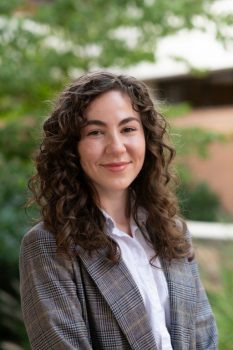Career Paths: Rebecca Mitchell ’21L Rebecca Mitchell will be clerking on the Vermont Supreme Court for two years.
Rebecca Mitchell graduated from the University of St. Andrews with a joint honors degree in International Relations and Social Anthropology in 2018. Rebecca spent her 1L summer interning with the United Nations Pacific Regional Anti-Corruption Project in Fiji and split her 2L summer between the Vermont Supreme Court and DLA Piper’s European Pro Bono Office. At W&L Law, she served as an upper board member of the Washington and Lee Law Review and Co-President of the Women Law Students Organization.
Where will you be working after graduation and in what practice area?
After graduation, I will be clerking for Justice Harold E. Eaton on the Vermont Supreme Court for two years.
Did you know coming into law school that you wanted to clerk?
I did not think about clerking at all before my second year of law school. I was primarily focused on going abroad again or doing some type of international work immediately after graduating. However, when I started my classes, I decided I was interested in litigating domestically to start my career, which led me to think about clerking. Ms. Hilton and members of the clerkship committee encouraged me to apply.
Was there anything in your law school or summer job experience that confirmed this career choice?
Although I am extremely grateful for my summer experience in Fiji, it made me realize that I wanted to be in the courtroom rather than work for an NGO. After hearing professors gush about their clerkship experiences, I turned to the idea of clerking as a way to continue learning and to ease my way into the U.S. legal system, since I went straight through to law school from undergrad. After I accepted my clerkship with Justice Eaton, he offered to take me on as a summer intern since my job with DLA Piper was postponed due to the pandemic. Interning for him really confirmed that I made the right decision. I know that I want to do appellate litigation and that the work I will be doing next year will be invaluable for pursuing that path.
What classes do you think are helpful to prepare for this job?
I think taking a wide range of doctrinal classes on bar topics is the best way to prepare for both the bar and a state court clerkship. In particular, I think criminal procedure will be helpful. I would also recommend the Judicial Externship and either the trial or appellate advocacy practicum to improve your knowledge of the courtroom process, rules of evidence, and standards of review. Lastly, I think being on a journal gives you a leg up in terms of writing ability.
Can you describe the job search process?
I decided to pursue both state supreme court and federal clerkships. However, state supreme courts often accept applications well before the online system for federal applications opens for 2Ls. Because of this, I was hired before the federal application process got into full swing. I found this clerkship opportunity posted on SCORE and applied to the Vermont Supreme Court as a whole, which had clerk vacancies for four of the five justices. I received interviews from two justices and immediately scheduled a mock interview with Professor Weiss for the day before my first interview. I did a video conference interview with Justice Eaton and his current clerk, and then talked alone with his clerk to discuss the position. Justice Eaton called me a few hours later that day to offer me the post-graduate position and the summer internship opportunity. During my summer internship, Justice Eaton asked me to stay on for two years instead of one.
What are you most looking forward to about this job?
I am extremely excited about being a small part of the process of creating binding precedent. Working for the highest appellate court in a state provides the unique opportunity to create good law on a broad range of interesting legal questions.
 Rebecca Mitchell ’21L
Rebecca Mitchell ’21L
You must be logged in to post a comment.